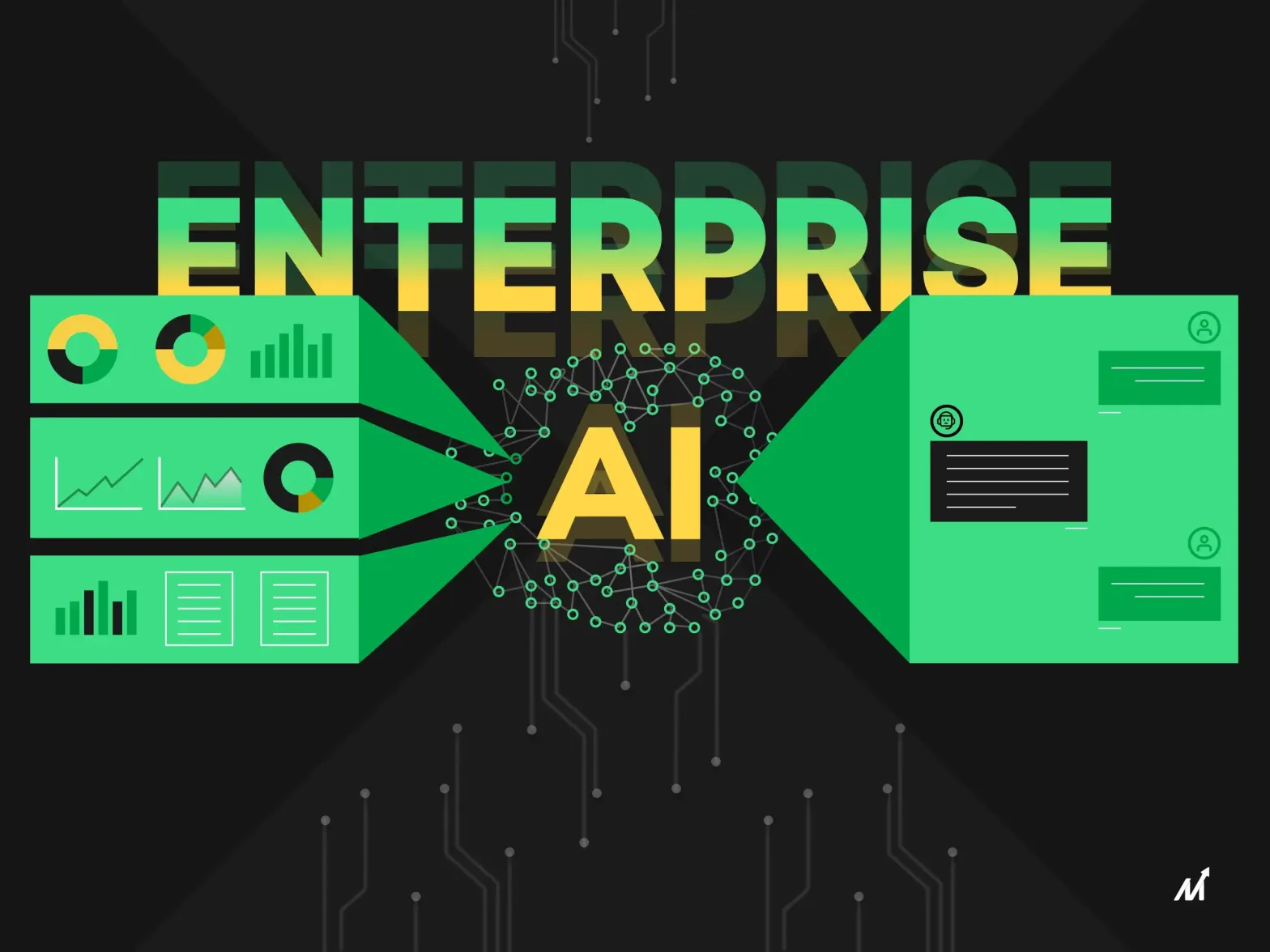Imagine a business where manual operations, slow decision-making, and vast amounts of unstructured data are the norm. Such digitally outdated organizations struggle to keep up with fast-changing market demands, leading to inefficiency and decreased productivity, making it hard to survive in today’s competitive landscape.
Without AI, companies rely heavily on humans for even the most mundane tasks, resulting in higher costs, increased error rates, and limited scalability. This is where AI for enterprise becomes a game-changer. By integrating machine learning, natural language processing, predictive analytics, and robotic process automation, businesses can automate repetitive tasks, reduce inaccuracies, and enable quick, informed decision-making based on large datasets.
For entrepreneurs aiming to build resilient, forward-thinking enterprises, embracing AI is crucial. This article will guide you on how AI can redefine business operations, competition, and growth in a digital and data-centric world.
How AI Fits into Enterprises
AI seamlessly integrates into various aspects of a firm’s operations, significantly boosting productivity. According to PWC, AI has the potential to increase employee productivity by approximately 40% by 2035. This is due to AI’s ability to automate repetitive tasks and analyze vast datasets quickly, leading to informed decisions.
Modern AI applications provide insights into business operations and market trends, enabling companies to stay ahead of their competitors. Predictive analytics helps make future-oriented adjustments, improving operational flexibility. AI also enhances enterprise security by recognizing and blocking cyber threats before they cause damage.
Additionally, AI fosters innovation by analyzing market trends and understanding consumer behavior, allowing companies to develop new products and services that meet emerging demands. Generative AI, a subset of AI, creates new content like text, images, and code, automating content creation, developing innovative marketing strategies, and enhancing customer engagement.
These examples demonstrate that AI is not just an add-on but an integral part of modern business operations, resulting in enhanced efficiency, improved decision-making, strengthened security systems, and sustainable management.
Benefits of Incorporating Enterprise AI Solutions
Incorporating AI into business operations offers tangible benefits that address modern business challenges:
- Revenue Growth through Predictive Sales Analytics: AI identifies potential sales opportunities and customer segments likely to convert, helping businesses forecast future sales trends and optimize pricing strategies, leading to increased revenue.
- Cost Reduction in Operations: AI automates routine processes, such as invoice processing and financial reporting, reducing operational costs and saving millions annually.
- Optimized Inventory Management: AI-powered demand forecasting reduces overstock and stockouts, improving turnover rates and lowering carrying costs, leading to enhanced operational efficiency.
- Improved Talent Acquisition and Retention: AI improves recruitment processes by assessing the best candidate fit and predicting employee turnover, leading to improved employee retention and lower hiring costs.
- Accelerated Research and Development: AI speeds up R&D by analyzing massive datasets, identifying new product opportunities, and optimizing existing ones, enabling companies to introduce new products quickly and maintain competitiveness.
These benefits demonstrate the value of AI in enterprise operations, enhancing the bottom line and providing tools to navigate complex business challenges and maintain a competitive edge.
Key AI Sub-Technologies Impacting Enterprises
Understanding the primary sub-technologies used in AI enterprise software development is crucial for businesses:
- Machine Learning: Helps enterprises learn from data and identify patterns with minimal human involvement.
- Natural Language Processing (NLP): Enables computers to understand, interpret, and respond to human language, enhancing customer service automation and communication efficiency.
- Computer Vision: Allows machines to see and make decisions based on images or videos, improving security and other applications.
- Robotic Process Automation (RPA): Automates routine tasks like data entry and invoice processing, improving efficiency.
- Predictive Analytics: Uses statistical algorithms and machine learning to forecast future outcomes, aiding in demand estimation and risk assessment.
- Speech Recognition: Converts spoken language into written text, enhancing customer care and transcription services.
- Deep Learning: Uses neural networks to detect intricate patterns in data, aiding in detailed data analysis and performance forecasts.
- Generative AI: Creates new content, automating creative processes and enhancing customer engagement and marketing strategies.
AI for Enterprise: Buy vs Build
When integrating AI, businesses must decide between buying off-the-shelf solutions or building custom platforms. Building custom platforms offers significant long-term advantages, including:
- Customization and Flexibility: Tailored solutions that meet specific business needs.
- Integration with Existing Systems: Seamless integration with current IT infrastructure.
- Scalability: Easy expansion and addition of new features as the enterprise grows.
- Competitive Advantage: Implementation of proprietary algorithms and models for unique insights.
- Cost Efficiency in the Long Run: Eliminates ongoing licensing fees and modification costs.
- Ownership and Control: Full ownership and control over the AI platform.
- Addressing Specific Use Cases: Designed to tackle unique challenges and align with business objectives.
The Cost of Bringing AI for Enterprise Projects to Life Investing in enterprise AI software involves various costs, including initial development, preparation, integration, deployment, and ongoing maintenance. Partnering with an outsourced development firm can streamline the process, but it comes with its own set of costs.
Challenges of Incorporating AI in Enterprises Enterprises face several challenges when adopting AI technologies:
- Data Quality and Availability: High-quality data is essential for accurate AI models.
- Integration with Legacy Systems: Legacy systems may not support AI technologies, requiring customized APIs and skilled IT personnel.
- Ethical and Privacy Concerns: Handling sensitive data ethically is crucial for maintaining user trust.
- Scalability Issues: Scaling AI solutions from prototypes to full-scale implementation can be challenging.
- Continuous Monitoring, Updating, and Testing: AI systems require constant supervision and updates to maintain performance.
- Generative AI Challenges: Ensuring ethical use and managing computational resources are key considerations.
Partner with Us to Leverage the Growing Enterprise AI Market Appinventiv has extensive experience in implementing AI solutions for enterprises. From boosting conversion rates for KFC to reducing customer churn for a leading European bank, our AI-driven solutions have delivered significant results. We support clients throughout the AI implementation process, offering strategic guidance and post-development promotion.
Marketing Your Enterprise AI Software Post-Development Effectively marketing an enterprise AI platform requires a strategic approach:
- LinkedIn Sales Navigator for Targeted Outreach: Identify key decision-makers and highlight how your AI platform solves their specific problems.
- Join Niche Industry Forums and Groups: Engage in discussions and mention your AI platform discreetly.
- Conduct Local Workshops and Seminars: Attract local business owners and IT managers with live demos and open discussions.
- Provide a Time-Limited Free Trial: Offer free trial access to potential clients to showcase the platform’s value.
- Utilize Pay-Per-Click Advertising: Create targeted PPC campaigns to attract potential clients.
Incorporating AI into enterprise operations is a necessity for staying competitive in a digital ecosystem. With careful planning and a skilled partner, businesses can successfully implement AI, reaping substantial benefits and positioning themselves for long-term success.
FAQs
What is Enterprise AI? Enterprise AI refers to the integration of AI technologies into the core operations of large-scale organizations. It includes applications like machine learning, NLP, computer vision, and RPA, aimed at enhancing business operations, providing data-driven insights, improving decision-making, and driving innovation.
How Can AI Help Enterprises? AI transforms enterprises by automating tasks, analyzing data, and providing actionable insights. It increases operational efficiency, reduces costs, and enhances decision-making. Examples include predictive maintenance, AI-powered customer service, and improved sales and marketing efforts through customer behavior analysis.
How to Implement AI in the Enterprise? Implementing AI involves defining business objectives, ensuring high-quality data, collaborating with skilled AI professionals, integrating AI systems with existing IT infrastructure, and addressing challenges like data privacy and scalability. Continuous monitoring, maintenance, and employee training are also crucial for successful implementation.








